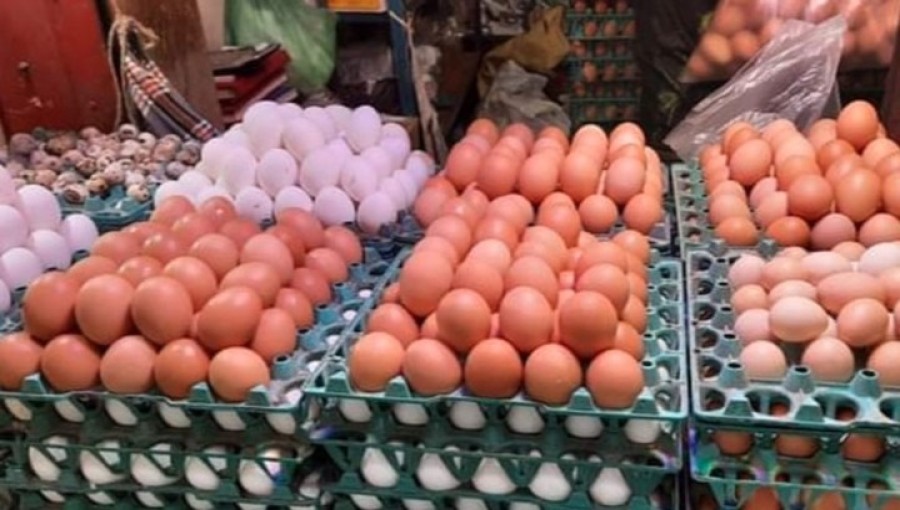Over the past few weeks, the cost of eggs in local markets has soared uncontrollably, creating significant challenges for consumers who rely on eggs, especially during the monsoon season and flood conditions. The sudden price hike has affected both urban and rural areas, leaving many struggling to afford this essential food item.
Sylhet, June 30 (V7N)- In recent days, there has been much discussion and criticism regarding the skyrocketing prices of eggs Sylhet district in Bangladesh. Over the past few weeks, the price of eggs in the markets of Sylhet has increased uncontrollably. Due to the dependency on eggs during the monsoon season and flood conditions, general consumers in Sylhet are struggling with the high prices.
Fish and meat have been out of reach for many due to their high prices for a long time, and now the sudden increase in egg prices has impacted both urban and rural areas. Eggs that once cost thirty taka per dozen a year ago, and sometimes dipped below fifty, are now priced above sixty taka per dozen. The price varies slightly depending on the store and location. The egg market in Sylhet is trapped in the grip of a powerful syndicate.
In the retail market, shopkeepers say they now sell eggs just to keep their businesses running. Titu, the proprietor of Matri Store, a grocery store in Kadamtali, said, "I stopped the egg business a long time ago. The way egg prices are increasing, there is no opportunity to make a profit from selling eggs." Currently, eggs are being sold for fifty-five to sixty taka per dozen for the past two weeks. They have to keep eggs in the store to retain customers, even though there is no profit margin. On days when a couple of eggs break, they end up with a loss rather than covering costs. Now, eggs are sold only to retain customers.
The impact of rising egg prices is also being felt in hotels, restaurants, and food stalls. A forty-taka Moglai now sells for sixty to eighty taka. Due to decreased customer turnout, many food stalls have started offering half-egg Moglai to lower prices. Gautam Roy of Three Sisters Snack Bar in Jallarpar said, "Previously, we sold the most Moglai Paratha in the evenings. A full-egg Moglai was priced at forty taka.
Now, due to the increased price of eggs, it is priced at sixty taka. Because of fewer customers, we have been forced to make smaller-sized half-egg Moglai. Moreover, earlier we sold many egg omelets with parathas in the morning. Now, egg omelets are hardly sold in the morning. Due to the lack of control over egg prices, we cannot maintain consistent pricing for food items. The price people see one day changes the next day. This is hurting our business. There was never so much chaos over eggs before."
It is known that the egg market has fallen into the hands of a fearsome syndicate named 'Corporate.' As a result, many are leaving the business due to continuous losses. This syndicate controls the entire country, from the capital to rural areas. Since chickens across the country lay eggs simultaneously, the price of eggs remains the same everywhere. This syndicate increases prices at will. They have common statements to justify price changes, such as reduced or increased demand, winter, summer, Ramadan, Eid, hartal (strike), and blockade affecting supply.
The production cost of a marginal egg is Tk 10.29. If the consumer price is Tk 12 to 12.5, it is considered reasonable. However, the way egg prices are determined is: eggs are collected from farms, sent to various places at night, and prices are set after the Fajr prayer. These prices are disseminated nationwide via SMS and Facebook, implementing the increased or decreased prices.
This practice shows that the price per piece can drop by Tk 7 per piece, bringing down the price by Tk 10-20 per hundred eggs daily, only to increase it back up to Tk 13 per piece using the same method. Eggs are bought at lower prices and stored for 5 to 7 days in shops or warehouses, or in cold storage for longer periods. This benefits egg traders nationwide, while producers and consumers suffer.
The syndicate then sells these eggs at higher prices, making excessive profits. On the other hand, producers, not getting fair prices, are leaving production, leading to their loss.
END/V7N/AKS/DK/





























Comment: